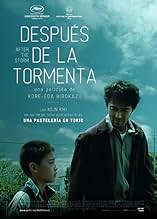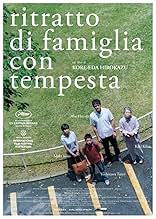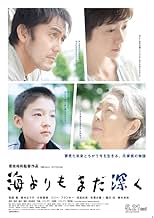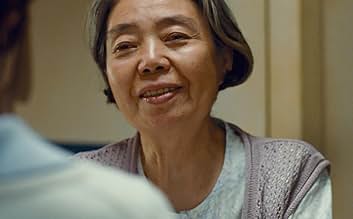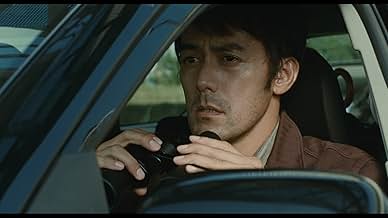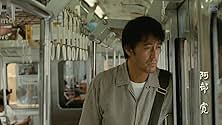NOTE IMDb
7,4/10
14 k
MA NOTE
Après la mort de son père, un détective privé a du mal à payer sa pension alimentaire et à renouer avec son fils et son ex-femme.Après la mort de son père, un détective privé a du mal à payer sa pension alimentaire et à renouer avec son fils et son ex-femme.Après la mort de son père, un détective privé a du mal à payer sa pension alimentaire et à renouer avec son fils et son ex-femme.
- Réalisation
- Scénario
- Casting principal
- Récompenses
- 2 victoires et 13 nominations au total
Avis à la une
After The Storm is an absolutely brilliant film, as it deals with the trials and tribulations of a father & perceived loser in the face of challenging life circumstances. Hiroshi Abe plays the role of Shinoda Ryota, a detective that is financially broke, divorced and living in the illusion of his past glory as an award winning author. He struggles to make ends meet and often resorts to gambling, stealing and backhand deals that involves extortion in order to support himself and to pay child support for his only son, Shingo.
Another eye-catching performance to look put for is by Ryota's mom, Yoshiko, played by Kirin Kiki. She absolutely nails the role of a bewildered, lonely and regretful single grandmother, often dwelling on the unfortunate circumstances of the past and blaming her late husband for how her son turned out. She provides most of the comedic moments in the movie, as her tendency to be over-bearing and cheapskate at times, will make you giggle in the very least. She also seems obsessed and resigned to the idea that she will die alone, hence she keeps requesting her son & daughter to keep her company as much as possible. On top of that, she also harbors the faint hope that her son can be re-united with his ex-wife, and tries to set them up to sleep together during a night of storm.
Overall, the theme of After the Storm is dealing with the present circumstances in the face of unrealized dreams and broken hopes. This theme is strong in the characters of Ryota and Yoshiko. Additionally, Ryota's ex-wife, Kyoko (played by Yoko Maki) also plays an important role as she embodies the person whom manages to focus her life solely in the present times. Whilst Ryota still perceives himself as the father responsible for Shingo's journey through his current childhood phase, Kyoko has moved on and has accepted the fact that Ryota was never cut out to be a responsible father. She has even found a new boyfriend and except for the monthly visit, would rather Shingo not be spending time with his actual dad.
What really catches the eye about this movie, is that even in a fully developed country like Japan, with is high standards of living and apparent high-culture, there exists people like Ryota; someone who is left behind by the fast-moving economy and rebels against the norm of participating in the corporate rat-race to succeed career-wise. He can be pictured as someone who is very defensive whenever questioned on his life choices and habits. However, just like a starry-eyed young graduate, Ryota had dreams of his own for a stable government job, which somehow never came to be. However, the pride in him never dissolves, as the once Award-winning author still feels he deserves recognition for his past work.
Another eye-catching performance to look put for is by Ryota's mom, Yoshiko, played by Kirin Kiki. She absolutely nails the role of a bewildered, lonely and regretful single grandmother, often dwelling on the unfortunate circumstances of the past and blaming her late husband for how her son turned out. She provides most of the comedic moments in the movie, as her tendency to be over-bearing and cheapskate at times, will make you giggle in the very least. She also seems obsessed and resigned to the idea that she will die alone, hence she keeps requesting her son & daughter to keep her company as much as possible. On top of that, she also harbors the faint hope that her son can be re-united with his ex-wife, and tries to set them up to sleep together during a night of storm.
Overall, the theme of After the Storm is dealing with the present circumstances in the face of unrealized dreams and broken hopes. This theme is strong in the characters of Ryota and Yoshiko. Additionally, Ryota's ex-wife, Kyoko (played by Yoko Maki) also plays an important role as she embodies the person whom manages to focus her life solely in the present times. Whilst Ryota still perceives himself as the father responsible for Shingo's journey through his current childhood phase, Kyoko has moved on and has accepted the fact that Ryota was never cut out to be a responsible father. She has even found a new boyfriend and except for the monthly visit, would rather Shingo not be spending time with his actual dad.
What really catches the eye about this movie, is that even in a fully developed country like Japan, with is high standards of living and apparent high-culture, there exists people like Ryota; someone who is left behind by the fast-moving economy and rebels against the norm of participating in the corporate rat-race to succeed career-wise. He can be pictured as someone who is very defensive whenever questioned on his life choices and habits. However, just like a starry-eyed young graduate, Ryota had dreams of his own for a stable government job, which somehow never came to be. However, the pride in him never dissolves, as the once Award-winning author still feels he deserves recognition for his past work.
Most films these days do not have something to 'say' anymore. They don't have a deeper meaning. And if they do, it's mostly superficial or so complex you don't really understand. 'After the Storm' by Hirokuzu Kore-eda has something to say, it's like a condensed moment of life. You will be dumbstruck by it's beauty.
The story deals with Ryota, struggling with financial problems, and trying to keep contact with his son after divorcement. He works as a private detective, spying on affairs and looking for lost cats while his real passion lies in writing literature.
The entire film is built around a central story part where they take shelter from a taifun, it involves scenes of such profound beauty, you will be moved to tears. The beauty lies in the things that are not spoken out, yet linger in the air like rain: the missed opportunities to be happy, love gone by and yet - still there.
To say the film deals with abandoned dreams in the face of reality is wrong, it's the contrary. The film says: If you keep waiting for beauty in life, you will not realize that it has already arrived. Just not the way you thought it would.
The story deals with Ryota, struggling with financial problems, and trying to keep contact with his son after divorcement. He works as a private detective, spying on affairs and looking for lost cats while his real passion lies in writing literature.
The entire film is built around a central story part where they take shelter from a taifun, it involves scenes of such profound beauty, you will be moved to tears. The beauty lies in the things that are not spoken out, yet linger in the air like rain: the missed opportunities to be happy, love gone by and yet - still there.
To say the film deals with abandoned dreams in the face of reality is wrong, it's the contrary. The film says: If you keep waiting for beauty in life, you will not realize that it has already arrived. Just not the way you thought it would.
In a relatively short time span, I've seen three films by Hirokazu Kore-Eda, and I'm planning to see many more. It seems most of his work is focused on family relations, and his films are touching, heartfelt real life dramas. The raw material for Kore-Eda's films are emotions, and the ways his protagonists express them in words and by their behaviour.
Like the two other films I've seen ('Our Little Sister' and 'Like Father, Like Son'), 'After the Storm' deals with parents, children, grandchildren and siblings. In this case, the central character is a divorced writer with financial problems, who has taken a job as a private detective to make ends meet. To keep up appearances, he pretends the job is a way of doing research for a new novel, but everyone knows there is no book.
His young son is very fond of his grandma, so they go visit her. But typhoon number 24 is approaching fast, and when the writer's ex-wife comes to the apartment to pick up the boy, the bad weather conditions prevent them from going home. They have to spend the night at the grandmother's house, just as if they were a normal family. And in a way, they almost are, during that one special night. After the storm, everything has returned to normal, except that the four of them are closer than they were before. The last shot is full of symbolism: the sun shines, but several broken and abandoned umbrellas are the witnesses of the stormy night.
It takes superior film making skills to turn such a story into a good movie. The emotions have to be measured out with care, in order to prevent it from turning into a tearjerker. The dialogue has to be natural, but at the same time not superficial. And the actors have to be completely believable. Just leave it to Kore-Eda: every scene is a joy to watch. It's those little things that make his characters so real: when his mother starts pleading him to stay the night, the writer says: oh, mother, please don't use this voice like you're almost dying. These are exactly the things mothers and sons say to each other, with a mix of affection and irritation.
The director also gives little hints and references which you only fully understand after a while. At the very beginning, the writer's mother remarks that a neighbour has moved to a bigger house. Only much later we learn that this has always been her own dream, and that she's tired of her own tiny apartment. I think it takes a second viewing to get all the tiny hints sprinkled throughout the story.
Are we what we hoped to be? And what was it exactly we hoped to be? Those are the questions 'After the Storm' deals with. There are no clear cut answers. But thinking about the questions makes this film worthwhile.
Like the two other films I've seen ('Our Little Sister' and 'Like Father, Like Son'), 'After the Storm' deals with parents, children, grandchildren and siblings. In this case, the central character is a divorced writer with financial problems, who has taken a job as a private detective to make ends meet. To keep up appearances, he pretends the job is a way of doing research for a new novel, but everyone knows there is no book.
His young son is very fond of his grandma, so they go visit her. But typhoon number 24 is approaching fast, and when the writer's ex-wife comes to the apartment to pick up the boy, the bad weather conditions prevent them from going home. They have to spend the night at the grandmother's house, just as if they were a normal family. And in a way, they almost are, during that one special night. After the storm, everything has returned to normal, except that the four of them are closer than they were before. The last shot is full of symbolism: the sun shines, but several broken and abandoned umbrellas are the witnesses of the stormy night.
It takes superior film making skills to turn such a story into a good movie. The emotions have to be measured out with care, in order to prevent it from turning into a tearjerker. The dialogue has to be natural, but at the same time not superficial. And the actors have to be completely believable. Just leave it to Kore-Eda: every scene is a joy to watch. It's those little things that make his characters so real: when his mother starts pleading him to stay the night, the writer says: oh, mother, please don't use this voice like you're almost dying. These are exactly the things mothers and sons say to each other, with a mix of affection and irritation.
The director also gives little hints and references which you only fully understand after a while. At the very beginning, the writer's mother remarks that a neighbour has moved to a bigger house. Only much later we learn that this has always been her own dream, and that she's tired of her own tiny apartment. I think it takes a second viewing to get all the tiny hints sprinkled throughout the story.
Are we what we hoped to be? And what was it exactly we hoped to be? Those are the questions 'After the Storm' deals with. There are no clear cut answers. But thinking about the questions makes this film worthwhile.
Kore-eda is a renowned Japanese director for personable family dramas. His work in 'Still Walking' and 'Like Father, Like Son' (although yet to see) prove he is a capable writer when dealing with common family experiences. Marital woes, grief, father and son relationships. The list goes on. This being my first Kore-eda experience, I was unsure which angle to approach this blistering drama with. Regardless, no matter how I set my mind, it was an evocative and multi-layered drama with a masterful level of maturity. A novelist turned private detective, who is struggling for money due to a gambling addiction, coincidentally finds himself stuck at his mother's house overnight when a typhoon hits Japan. At the time the storm hits, his ex-wife and son are also there and spend the night within this claustrophobic environment.
Metaphorically speaking, the typhoon is a vivid representation of the estranged behaviour from both Ryota and Kyoko. Their differences splitting the family apart with such velocity. Yet, there is no hatred. No malice. And that is what I adore about Kore-eda's approach, it doesn't conform to typical clichés. He treats the audience like adults and executes a realistic family drama without needing any overly dramatic plots. Just two characters talking, with personable dialogue that has a surprising amount of wit, attempting to reconcile their differences for the betterment of themselves and their son. The storm acts as plot device for Ryota, allowing him to use the natural disaster to bond with his son. Then, once it subsides, life continues. A profound statement for most families.
Kore-eda explores various areas of urban Japanese culture, especially gambling and poverty, that enables this drama to be multi-layered. But what really cemented his masterful screenplay was just how it personal it was to him. Immediately the characters are bursting with dimensionality, enabling us to invest the time into their stories. Whilst also dealing with the scope of life, by indicating that "grown-ups cannot live only with love". A fascinating character study of a man who's personal ambitions get in the way of living life now. Though the narrative structure is not as fluid as the rain pummelling down from the storm, due to the abrupt transition between the first half before the storm and the second half, it still remains a rigid story.
This is helped by Abe's resourceful performance which was incredibly nuanced. Ryota is a complicated character, and Abe executed his complexions with ease. The late Kiki also gave a noteworthy performance as his mother, offering various lessons on life as she attempts to fix broken bonds within her family. Yamasaki's cinematography was gorgeous, cleanly enveloping you in Japan's natural and urban beauty. Kore-eda also frequently utilised long takes of unedited dialogue exchanges which subconsciously draws you into the drama.
Another small criticism would be the underutilisation of Kyoko's new boyfriend, whom of which could've been used more effectively to display her inner conflict for starting a new family or mending the existing bonds for the sake of her son. Small nitpicks here and there for what is a genuinely mature drama that felt both personal and personable, bolstered by sterling performances and a valuable screenplay. Am excited to see what Kore-eda has in store for us in the future. Oh, and bonus points for showcasing 'Taiko No Tatsujin' (I frickin' love that game...).
Metaphorically speaking, the typhoon is a vivid representation of the estranged behaviour from both Ryota and Kyoko. Their differences splitting the family apart with such velocity. Yet, there is no hatred. No malice. And that is what I adore about Kore-eda's approach, it doesn't conform to typical clichés. He treats the audience like adults and executes a realistic family drama without needing any overly dramatic plots. Just two characters talking, with personable dialogue that has a surprising amount of wit, attempting to reconcile their differences for the betterment of themselves and their son. The storm acts as plot device for Ryota, allowing him to use the natural disaster to bond with his son. Then, once it subsides, life continues. A profound statement for most families.
Kore-eda explores various areas of urban Japanese culture, especially gambling and poverty, that enables this drama to be multi-layered. But what really cemented his masterful screenplay was just how it personal it was to him. Immediately the characters are bursting with dimensionality, enabling us to invest the time into their stories. Whilst also dealing with the scope of life, by indicating that "grown-ups cannot live only with love". A fascinating character study of a man who's personal ambitions get in the way of living life now. Though the narrative structure is not as fluid as the rain pummelling down from the storm, due to the abrupt transition between the first half before the storm and the second half, it still remains a rigid story.
This is helped by Abe's resourceful performance which was incredibly nuanced. Ryota is a complicated character, and Abe executed his complexions with ease. The late Kiki also gave a noteworthy performance as his mother, offering various lessons on life as she attempts to fix broken bonds within her family. Yamasaki's cinematography was gorgeous, cleanly enveloping you in Japan's natural and urban beauty. Kore-eda also frequently utilised long takes of unedited dialogue exchanges which subconsciously draws you into the drama.
Another small criticism would be the underutilisation of Kyoko's new boyfriend, whom of which could've been used more effectively to display her inner conflict for starting a new family or mending the existing bonds for the sake of her son. Small nitpicks here and there for what is a genuinely mature drama that felt both personal and personable, bolstered by sterling performances and a valuable screenplay. Am excited to see what Kore-eda has in store for us in the future. Oh, and bonus points for showcasing 'Taiko No Tatsujin' (I frickin' love that game...).
There are not many directors whose films I greet with enthusiasm, let alone Japanese ones. I think Hirokazu Koreeda is the only one. His films are a different breed - simple in design, but brilliant in architecture and sublime in closure.
Koreeda is the leading exponent in contemplative cinema. Under his minimalist approach, the essence of familial life and couplehood is distilled into abstract thoughts lingering like warm tendrils wrapped around your mind. The movie may be over but it refuses leave the confines of your consciousness and you would want to surrender to its warm lull again. The tone of After the Storm is pitch-perfect - nobody screams in your face, there are no pointing fingers, no low brow soap-opera. The acting is exquisite and nuanced. What is not said speaks louder than what is uttered. There is humour of the familiar kind; it is the kind of humour you laughed heartily because it is so familiar and you recognise the situations because you have gone through them before. There are not many filmmakers who are as sensitive as Koreeda. Above all else, this is a director who listens to characters' inner thoughts and emotions like an old master piano tuner and he knows how to calibrate the performances for everlasting emotional heft. For Koreeda, it is always about the small moments leading to the big truths.
After the Storm is not one of Koreeda's best films (it needlessly took too long to establish Ryota's character) but it easily transcends way above all the flashy films that inundate our cinemas like ants to candies. I wish I had a notebook last night because some of the metaphors are amazing. Here is one, asseverated by the grandmother Yoshiko, "The longer a stew sits, the more flavour it develops, just like people."
Koreeda is the leading exponent in contemplative cinema. Under his minimalist approach, the essence of familial life and couplehood is distilled into abstract thoughts lingering like warm tendrils wrapped around your mind. The movie may be over but it refuses leave the confines of your consciousness and you would want to surrender to its warm lull again. The tone of After the Storm is pitch-perfect - nobody screams in your face, there are no pointing fingers, no low brow soap-opera. The acting is exquisite and nuanced. What is not said speaks louder than what is uttered. There is humour of the familiar kind; it is the kind of humour you laughed heartily because it is so familiar and you recognise the situations because you have gone through them before. There are not many filmmakers who are as sensitive as Koreeda. Above all else, this is a director who listens to characters' inner thoughts and emotions like an old master piano tuner and he knows how to calibrate the performances for everlasting emotional heft. For Koreeda, it is always about the small moments leading to the big truths.
After the Storm is not one of Koreeda's best films (it needlessly took too long to establish Ryota's character) but it easily transcends way above all the flashy films that inundate our cinemas like ants to candies. I wish I had a notebook last night because some of the metaphors are amazing. Here is one, asseverated by the grandmother Yoshiko, "The longer a stew sits, the more flavour it develops, just like people."
Le saviez-vous
- AnecdotesAlbeit released later, this film wrapped earlier than Koreeda's previous film Notre petite soeur (2015). The month-and-a-half filming of After the Storm took place starting in May 2014 in between the production of Our Little Sister, which was shot throughout a year.
- Citations
Shinoda Yoshiko: I wonder why it is that men can't love the present. Either they just keep chasing whatever it is they've lost... or they keep dreaming beyond their reach.
- ConnexionsReferences Mon voisin Totoro (1988)
- Bandes originalesShinkokyû
Music and lyrics by Takashi Nagazumi
Performed by Hanaregumi
Courtesy of Victor Records and Speedstar Records
Meilleurs choix
Connectez-vous pour évaluer et suivre la liste de favoris afin de recevoir des recommandations personnalisées
- How long is After the Storm?Alimenté par Alexa
Détails
- Date de sortie
- Pays d’origine
- Site officiel
- Langue
- Aussi connu sous le nom de
- After the Storm
- Lieux de tournage
- Kiyose, Tokyo, Japon(Train station)
- Sociétés de production
- Voir plus de crédits d'entreprise sur IMDbPro
Box-office
- Montant brut aux États-Unis et au Canada
- 272 132 $US
- Week-end de sortie aux États-Unis et au Canada
- 27 880 $US
- 19 mars 2017
- Montant brut mondial
- 5 382 886 $US
- Durée1 heure 58 minutes
- Couleur
- Mixage
- Rapport de forme
- 1.85 : 1
Contribuer à cette page
Suggérer une modification ou ajouter du contenu manquant


